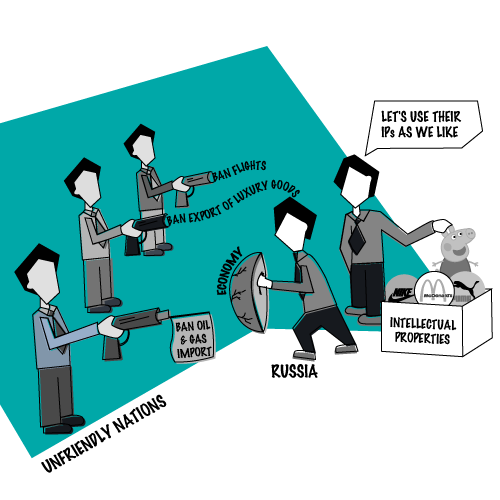The Intellectual Property War: Russia vs U.S and E.U

Introduction
The worrisome situation of absence of intellectual property laws and its repercussions are no longer a hypothetical thesis. The unprecedented attack by Russia on the world’s famous trademarks and copyrights is the first international model to legalize trademark infringement and dilution, trademark squatting and influxing of gray market goods. The social and economic ramifications of such an attack on intellectual property from around the world is unimaginable. Being a signatory to the Trade Related Aspects of Intellectual Property Rights (TRIPS) agreement and being a member of the World Trade Organization, Russia will claim the exception of ‘national security’ (like in 2014) if proceeded against with any suit in any international forum. The Ministry of Russia has also suspended liabilities for parallel imports and have opted out with civil liability for trademark infringement. The trade related concerns around the world would curb not only the luxury market, food industry, media industry but would also the technological developments.
History of events
In the year 2021, even before the war started, the United States of America added Russia to the ‘priority watch list’ which essentially meant that the status of ‘most-favored-nation’ and ‘most-sanctioned-nation’ was snatched away. As the news of Russia attacking Ukraine started spreading, the United States and the European Union prohibited export of luxury goods to Russia and claimed to do so on a humanitarian basis. The prohibition also extended to crypto assets.
After being bombarded with such ill treatments, Russia declared countries that sanctioned against it as ‘unfriendly nations’ and the Federal Services for Intellectual Property Rights in Russia, also known as Rospatent, lifted restrictions on the use of Intellectual Property such as trademarks and patents for certain types of goods and services in Russia. It was the case of Peppa Pig that was a spark for the huge wildfire of infringements, wherein using of characters of Peppa Pig by a national channel was not deemed to be infringement. The repercussion of such an act increased bad faith trademark filing and import of gray market goods leading to trademark squatting and infringements to the United States and the European Union. The first and foremost brands that took the hit were Adidas, Nike, Puma and even McDonalds.
Additionally, the Russian government passed a decree which allowed the native companies in Russia to use the patent protected products and the technologies of such ‘unfriendly nations’. The Ministry also opted out for civil liability for any such infringements.
The effects on internationally recognized brands
Companies initially feared trademark disparagement, trademark squatting, trademark dilution and counterfeiting. Luxury Fashion house “Chanel”, in the month of May, ensured that its customers confirmed their purchase of the brand’s product might not at any chance be used in Russia which invited accusations against the brand for being ‘Russophobic’. Such an act by Chanel was also considered to be a stand that was taken by the brand on world geopolitics leading to trademark tarnishment by the angry influencers and celebrities in Russia. Many brands fear instances as such and hence are not taking any stand.
Japan also had claimed to prohibit all the export of luxury goods and cars to Russia from April 4th, 2022, which might eventually lead Russia to put Japan under its list of ‘unfriendly nations’. To think of the technological developments and the amount of patents Japan currently holds being infringed by Russia under its ‘national security’ terms might definitely bring a huge distortment in technological development.
Brands also lose control over importation of goods into Russia by any other distributor from the world. Bentley, Ferrari, Rolls Royce and Apple have also entered the list of exempted brands and Russia claims to defend the interests of domestic consumers from brands that left the Russian market and has allowed parallel imports into Russia without any threat of trademark infringement claims. The authorities also claim that such parallel imports are limited to goods including clothing, leather, automobile, mobile phone and also spare parts of machinery, but the brands of the goods are not mentioned.
Question of Returning to Normalcy or Return to normalcy?
Many companies have acknowledged that such a war on Intellectual Property of their brands is at stake and their entire trade and trust have been disparaged. To return to normalcy would be very difficult for brands as well as the nation as a whole. The economic impact of such an attack over the intellectual property can be assessed to a certain extent, but the legal ramifications can be analyzed only with a wait and watch methodology. An act of war some may say, an act of revenge some may say but it is a movement of non-cooperation.

